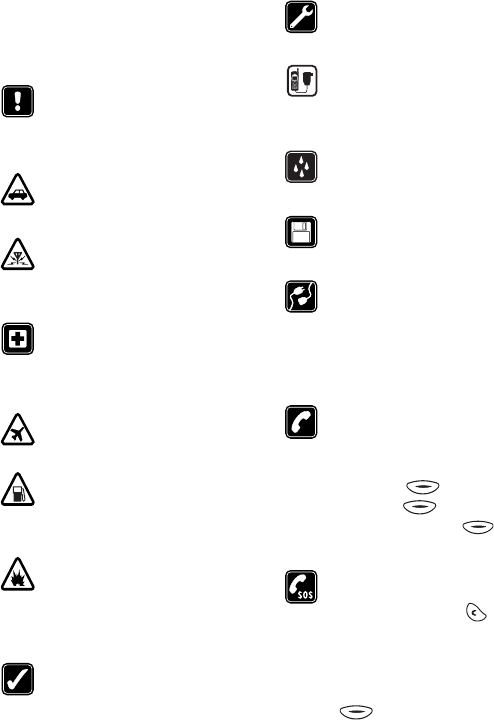
FOR YOUR SAFETY
Read these simple guidelines. Breaking
the rules may be dangerous or illegal.
Further detailed information is given in
this manual.
Do not switch on the phone
when wireless phone use is
prohibited or when it may cause
interference or danger.
ROAD SAFETY COMES FIRST
Do not use a hand-held phone
while driving.
INTERFERENCE
All wireless phones may get
interference, which could affect
performance.
SWITCH OFF IN HOSPITALS
Follow any regulations or rules.
Switch the phone off near
medical equipment.
SWITCH OFF IN AIRCRAFT
Wireless devices can cause
interference in aircraft.
SWITCH OFF WHEN REFUELLING
Do not use the phone at a
refuelling point. Do not use near
fuel or chemicals.
SWITCH OFF NEAR BLASTING
Do not use the phone where
blasting is in progress. Observe
restrictions, and follow any
regulations or rules.
USE SENSIBLY
Use only in the normal position.
Do not touch the antenna
unnecessarily.
QUALIFIED SERVICE
Only qualified personnel may
install or repair phone equipment.
ACCESSORIES AND BATTERIES
Use only approved accessories
and batteries. Do not connect
incompatible products.
WATER-RESISTANCE
Your phone is not water-
resistant. Keep it dry.
BACKUP COPIES
Remember to make backup
copies of all important data.
CONNECTING TO OTHER DEVICES
When connecting to any other
device, read its user's guide for
detailed safety instructions. Do
not connect incompatible
products.
CALLING
Ensure the phone is switched on
and in service. Enter the phone
number, including the area code,
then press (Call). To end a
call, press (End). To
answer a call, press
(Answer).
EMERGENCY CALLS
Ensure the phone is switched on
and in service. Press as
many times as needed (e.g. to
exit a call, to exit a menu, etc.)
to clear the display. Enter the
emergency number, then press
(Call). Give your location.
Do not end the call until told to
do so.
vi Copyright
©
2004 Nokia. All rights reserved.


















